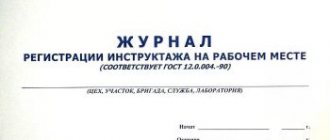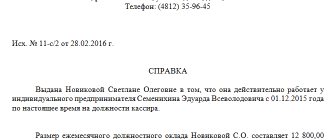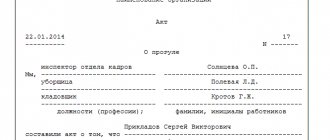Fines for illegally hiring a foreigner to work
Violations related to the illegal recruitment of foreigners to work are punishable by fines under Parts 1 and 2 of Art. 18.15 Code of Administrative Offenses of the Russian Federation:
| Violation | Fines, rub. | ||
| For citizens | On officials | For legal entities | |
| Involving a foreigner in labor activities in the absence of a work permit or patent, if required by law, as well as engaging in a profession not specified in the permit or patent, without obtaining special permission, if required by law | From 2,000 to 5,000 rubles. | From 25,000 to 50,000 rubles. | From 250,000 to 800,000 rubles. or suspension of activities for a period of 14 to 90 days |
| Failure to notify or violation of the established procedure and/or form of notification to the migration authority about the conclusion or termination of an employment contract or civil service contract with a foreigner within a period not exceeding 3 working days from the date of conclusion or termination of the contract, if such notification is required by law | From 2,000 to 5,000 rubles. | From 35,000 to 50,000 rubles. | From 400,000 to 800,000 rubles. or suspension of activities for a period of 14 to 90 days |
If the above violations were committed in Moscow or St. Petersburg or in the Moscow or Leningrad region, increased fines are applied (Part 4 of Article 18.15 of the Code of Administrative Offenses of the Russian Federation):
- for citizens: from 5,000 to 7,000 rubles;
- for officials: from 35,000 to 70,000 rubles;
- for companies: from 400,000 to 1,000,000 rubles. or suspension of activities for a period of 14 to 90 days.
The employer will pay a fine in the specified amount for violations committed against each foreigner individually.
As judicial practice shows, under Part 4 of Art. 18.15 of the Code of Administrative Offenses of the Russian Federation, a fine for illegal contractors can be imposed on the general contractor - it was he who allowed them to work without checking the legality of attracting foreign labor at the construction site (Resolution of the AS SZZ dated 09/04/2018 in case No. A56-65169/2017).
But if they are trying to punish you for not informing the migration authority about a change in the foreigner’s labor function (for example, transferring him from driver to salesperson), then such a fine will be illegal. The Supreme Court of the Russian Federation, in Resolution No. 31-AD20-3 dated September 18, 2020, recalled that the employer does not need to notify the Ministry of Internal Affairs about a change in the position, work address and other working conditions of a foreigner until the employment contract with him is terminated.
The fine for illegally recruiting a foreigner to work does not apply if the employee was not actually allowed to work (Note 1 to Article 18.15 of the Code of Administrative Offenses of the Russian Federation, paragraph 20 of the Resolution of the Plenum of the Supreme Arbitration Court of the Russian Federation dated February 17, 2011 No. 11).
Practice Review: Common Disorders
In most cases, the reasons for bringing entrepreneurs to justice are inattention or outright ignorance of the laws. Businessmen make the following mistakes:
- Lack of notice of dismissal of a foreigner. Employers are required to notify the Ministry of Internal Affairs of the Russian Federation not only about the conclusion, but also about the termination of employment contracts.
- Work on expired permits and patents. The expiration of the document is grounds for the employee's removal from office. The entrepreneur must not terminate the agreement with him. Migrants are given a month to complete new papers. A foreigner can be fired only after this period in the absence of a valid permit. There is no need to accrue wages during the suspension (Article 76 of the Labor Code of the Russian Federation).
- Exceeding limits. Russian Government Decree No. 1365 dated November 14, 2018 introduces a limit on the number of foreigners in the state. The standards apply in agriculture, retail trade, sports, and cargo transportation.
- Sending migrants on business trips. The traveling nature of work is unacceptable for some categories of foreigners. If an employee has the right to work only in one region, he cannot be sent on business trips. Exceptions are listed in the order of the Ministry of Health and Social Development of Russia No. 564n dated October 28, 2010. The maximum duration of business trips for persons specified in the act depends on the status. Persons who present a permit or patent upon employment can work outside the region for 10 days. In total, during the validity of the document, business trips should not exceed 60 days. Highly qualified specialists can only stay on a business trip for 30 days. However, the law does not provide for restrictions on the number of such absences. Migrants living in Russia temporarily have the right to travel on official business for 40 days in 1 year. If the work is traveling, the standard is increased to 90 days. The order does not mention other foreigners, and therefore sending them on business trips is risky.
- Cash payments. Payments to foreign employees can only be made through a bank. Letter No. ZN-4-17/15799 was published on the website of the Federal Tax Service of the Russian Federation. A similar position was expressed by the Supreme Court of Russia in Resolution No. 307-AD15-691. The restriction applies to non-resident foreigners - persons permanently staying in Russia for less than 183 days a year. It is also a violation to pay remuneration in foreign currency. Calculations are made only in rubles.
The list of offenses is difficult to call complete. An entrepreneur can be held liable for delays in sending documents, errors in forms, and even inattention. Do not forget about compliance with labor laws.
Fines for violations in the payment of salaries to HQS
In Art. 13.2 of Law No. 115-FZ specifies the salaries of foreigners-HQS, below which the employer has no right to pay. If an employer pays wages to foreign HQSs in violation of legal requirements, he may face:
- fines in the amount of up to 50,000 rubles, per company, up to 20,000 rubles. against the manager, if the fact of paying under-salaries to foreigners-HQS is revealed during an inspection by the labor inspectorate (Part 6 of Article 5.27 of the Code of Administrative Offenses of the Russian Federation);
- criminal liability of a manager for non-payment of wages to a foreigner-HQS for more than 3 months (Article 145.1 of the Criminal Code of the Russian Federation);
- a 2-year ban on attracting new foreigners-HQS if the employer pays the foreigner-HQS a salary below the legal limit (clause 13 and clause 26.1 of Article 13.2 of Law No. 115-FZ).
Amount of penalties
The work of foreigners in Russia is controlled by migration services. The amount of penalties depends on the type and severity of the violation of the law. The amount of the penalty imposed on the guilty persons is determined by the court. The maximum liability is borne by a legal entity .
Illegal transportation of foreign workers across the border, according to Article 18.14 of the Administrative Code, is punishable by a fine of 50 to 100 thousand rubles. For each employee working illegally in an organization, a penalty of up to 1 million rubles is imposed. In case of systematic violation of migration legislation by organizations and their officials, they are brought to criminal liability.
Fine for violating the rules for attracting foreigners to work at retail facilities
An employer who attracts foreigners to work at retail facilities is obliged to comply with certain rules provided for by federal laws and other regulations (Article 13.2-13.3 of Law No. 115-FZ, Article 15 of Law dated December 30, 2006 No. 271-FZ “On Retail Markets” …" and etc.).
Punishment under Part 1 of Art. 18.16 of the Code of Administrative Offenses of the Russian Federation may follow if an individual entrepreneur or company managing a retail facility:
- provided a trading place on the territory of a retail facility, production, warehouse or other premises to a foreign citizen who was illegally recruited to work;
- issued a permit to a foreign citizen illegally carrying out trading activities;
- allowed a foreigner illegally carrying out trading activities to carry out its activities.
According to Part 2 of Art. 18.16 of the Code of Administrative Offenses of the Russian Federation, the same persons may be punished for providing retail space on the territory of a retail facility or other premises to other companies or individual entrepreneurs who:
- there is no permission to use the labor of foreigners, but they actually attract them to work;
- foreigners who do not have a work permit or patent work, if these documents are required by law.
Punishments for violations under Part 1 and Part 2 of Art. 18.16 of the Code of Administrative Offenses of the Russian Federation are the same in terms of the amount of fines and the duration of suspension of activities.
For these violations committed in Moscow or St. Petersburg or in the Moscow or Leningrad region, fines of more significant sizes are provided:
- for officials from 45,000 to 70,000 rubles,
- per company - from 450,000 to 1,000,000 rubles.
The concept of informal employment
What is informal employment?
In Russian legislation there is no such thing as informal employment. But in fact, the employer does not think about the fact that if an employee works for him without registration, then the law has been violated.
When applying for a job, a labor agreement must be concluded with each employee, which is provided for in Article 67 of the Labor Code. If you work for a company unofficially, then you do not sign any papers.
In this case, the employee is not in a very good position. He may not be paid wages, he may not have paid leave, he may not even have days off, which are provided for by the Labor Code.
Even if you came to a large company or to a friend to get a job, and you were offered to work exclusively on an agreement, then it is better to refuse such an offer. Since there is no guarantee that you will receive exactly what you were promised.
Fines for violating immigration rules
At the request of the migration authority, an employer who employs foreigners may be asked for documents for control purposes (registration data of foreign citizens who entered the Russian Federation at the invitation of the company, employment contracts with them, etc.).
According to Part 2 of Art. 18.11 of the Tax Code of the Russian Federation, an employer who fails to submit or untimely submits, at the request of the migration authority, documents or information about foreign persons subject to immigration control under the legislation of the Russian Federation, faces a fine:
- for officials - from 40,000 to 50,000 rubles;
- per company - from 400,000 to 500,000 rubles.
Violation of deadlines
Employers are also fined for failure to comply with the deadlines established by the Labor Code of the Russian Federation. Most often we are talking about vacations and vacation pay. The employer must notify the employee about the vacation two weeks in advance (Article 123 of the Labor Code of the Russian Federation) and pay vacation pay three days in advance (Article 136 of the Labor Code of the Russian Federation).
Often, companies violate these deadlines not through their own fault, but because they accommodated an employee who applied for leave less than three days before. But the judges are convinced that this does not relieve the employer from liability (decisions of the Moscow City Court dated April 18, 2019 in case No. 7-4171/2019 and the Perm Regional Court dated September 16, 2019 in case No. 7-1930/2019/21-1120/2019 ).
So, when signing such an application for leave from an employee, you need to take into account that it threatens fines for the company and the manager personally.
Fine for violating restrictions and prohibitions when hiring a foreigner
Migration legislation imposes certain prohibitions and restrictions that the employer must take into account when attracting foreign citizens to work. For example, foreign citizens recruited to work in the Russian Federation do not have the right to be in municipal service or to be commanders of civil aircraft. A complete list of professions “prohibited” for foreigners is presented in Art. 14 of the Law of July 25, 2002 No. 115-FZ.
In addition to prohibitions, this article also contains restrictions on certain professions. Thus, a foreigner is not prohibited from holding the position of chief accountant only if he has the status of permanently or temporarily residing in the Russian Federation and meets the legislative requirements (Part 5 of Article 14 of Law No. 115-FZ).
If the employer ignores these prohibitions and restrictions, punishment may follow under Part 1 of Art. 18.17 Code of Administrative Offenses of the Russian Federation:
Monetary irregularities
Inspectors check the timeliness of payments and the correctness of deductions. If the inspectors identify deductions that are not named in Art. 137 of the Labor Code of the Russian Federation, and the employer is unable to present a document confirming the employee’s consent to such withholding, the company will face a fine (decision of the Perm Regional Court dated September 19, 2019 in case No. 7-1997/2019(21-1164)).
Another basis for a fine is the compensation that the employer must accrue to the employee if he did not pay the money on time (Article 236 of the Labor Code of the Russian Federation). If such compensation is not paid on time, the company may also be fined 50 thousand rubles (Part 6 of Article 5.27 of the Code of Administrative Offenses of the Russian Federation). And it doesn’t matter what kind of money was not paid on time: salary, payment upon dismissal, or something else (decisions of the Moscow City Court dated July 22, 2019 No. 7-8240/2019, 7-8244/2019, 7-8245/2019 and No. 7-8241/2019, 7-8243/2019, Perm Regional Court dated September 19, 2019 in case No. 7-1997/2019(21-1164) and dated September 18, 2019 in case No. 7-1995/2019(21-1162) ).
Punishment for failure to comply with migration notification and other procedures
An employer who attracts foreigners to work and acts as a receiving party is charged with registering foreign citizens with migration registration and deregistering them (Law of July 18, 2006 No. 109-FZ “On Migration Registration...”, Law of July 25, 2002 No. 115-FZ “On the legal status of foreign citizens in the Russian Federation”, Decree of the Government of the Russian Federation of January 15, 2007 No. 9 “On the procedure for carrying out migration registration...”).
Failure to fulfill these duties results in administrative liability under Part 4 of Art. 18.9 Code of Administrative Offenses of the Russian Federation. Based on judicial practice under Part 4 of Art. 18.9 of the Code of Administrative Offenses of the Russian Federation, both officials and legal entities can be punished with a fine. For example, the company failed to fight off a fine of 400,000 rubles. for failure to fulfill the obligation to notify the migration department about the departure of a foreigner (Resolution of the Armed Forces of the Russian Federation dated March 13, 2020 No. 5-AD20-28).
And in another case, the fine was 40,000 rubles. according to Part 4 of Art. 18.9 was received by the general director of the company who did not inform the migration authority about the arrival of a foreign worker (Resolution of the Supreme Court of the Russian Federation dated June 18, 2019 No. 18-AD19-24).
According to Art. 18.9 of the Code of Administrative Offenses of the Russian Federation, punishment may follow for various violations:
| Violation | Fines, rub. | ||
| For citizens | On officials | For legal entities | |
| Failure by the employer to comply with the established procedure for preparing documents for the right of foreigners to stay in the Russian Federation, their residence, movement, change of place of stay or residence in the Russian Federation and travel outside its borders (Part 1 of Article 18.9 of the Code of Administrative Offenses of the Russian Federation) | — | From 40,000 to 50,000 rubles. | From 400,000 to 500,000 rubles. |
| Failure of the inviting party to take measures to ensure that the foreigner complies with his stated purpose of entry into the Russian Federation or occupation, as well as to ensure the departure of invited foreigners at the end of their stay in the Russian Federation (Part 2 of Article 18.9 of the Code of Administrative Offenses of the Russian Federation) | From 2,000 to 4,000 rubles. | From 45,000 to 50,000 rubles. | From 400,000 to 500,000 rubles. |
| Providing residential premises or a vehicle or providing other services to a foreigner located in the Russian Federation in violation of the established procedure or rules for transit passage through its territory (Part 3 of Article 18.9 of the Code of Administrative Offenses of the Russian Federation) | From 2,000 to 5,000 rubles. | From 35,000 to 50,000 rubles. | From 400,000 to 500,000 rubles. |
| Failure by the employer to fulfill obligations in connection with the implementation of migration registration (Part 4 of Article 18.9 of the Code of Administrative Offenses of the Russian Federation) | From 2,000 to 4,000 rubles. | From 40,000 to 50,000 rubles. | From 400,000 to 500,000 rubles. |
| The employer did not take measures to provide material, medical and housing support for the invited foreigner during his stay in the Russian Federation (Part 5 of Article 18.9 of the Code of Administrative Offenses of the Russian Federation) | — | From 40,000 to 50,000 rubles. | From 400,000 to 500,000 rubles. |
| The employer provided deliberately false information about the purpose of a foreigner’s stay in the Russian Federation when preparing documents for his entry into the Russian Federation (Part 6 of Article 18.9 of the Code of Administrative Offenses of the Russian Federation) | — | From 45,000 to 50,000 rubles. | From 400,000 to 500,000 rubles. |
According to Part 2 of Article 18.9 of the Code of Administrative Offenses of the Russian Federation, they can now be fined for failure to comply with new requirements for companies to interact with foreign citizens (Regulations approved by Decree of the Government of the Russian Federation of September 15, 2020 No. 1428). For example, if the employer does not provide the foreigner with his contact information or does not notify the Ministry of Internal Affairs within two working days about the loss of contact with him.
Reasons for imposing fines on company management
Labor relations between employer and employee must be formalized in accordance with legal regulations.
To hire a person for a position, the employer is obliged to conclude an employment contract with him, according to which both parties to the employment relationship have certain responsibilities. Such an agreement is drawn up and signed in two copies, indicating the date of employment. If the contract is fixed-term, then it is necessary to indicate the end date of the employment relationship. One copy of the agreement is kept by the employer, the other is given to the employee.
The date of admission is very important information, which indicates that the person is officially registered and started working from a certain point.
The contract must include the following: last name, first name, patronymic of the person being accepted, his personal data (passport number and series, INN and SNILS numbers), residential address. The employee must provide documents confirming education and qualifications for the position held. The contract must indicate the type and nature of the work and the work week schedule. These are integral components of an employment contract that cannot be violated.
An employee is obliged to properly perform his job functions and comply with the daily routine at the enterprise. And the employer, in turn, guarantees constant wages that correspond to the staffing schedule, pays taxes, and provides the employee with all benefits and social guarantees.
A person can work without registration for only three days, after which an employment contract must be drawn up.
Reasons for imposing fines:
- Late conclusion of an employment contract with an employee or absence of one. This leads to the fact that the employee does not have official earnings, and therefore no personal income tax is paid to the state;
- If the contract is not concluded, the employee’s length of service is not counted and payments are not made to the Pension Fund, which will negatively affect the registration of an old-age pension;
- Medical institutions may refuse to provide free assistance to an employee of any organization due to the fact that contributions to the health insurance fund are not paid;
When a person is not officially registered at an enterprise, he loses his rights. He cannot achieve a number of payments, for example, vacation pay, sick leave payments, and final payment. And when addressing these issues to the courts, he will not be able to prove the occurrence of such moments.
The question arises of how to avoid a fine for an unregistered employee, as well as administrative and criminal liability. The main thing is to legitimize the relationship between the employer and the employee in a timely and correct manner.
Criminal liability for foreign workers
An employer faces criminal liability if, when registering a foreigner at the place of stay:
- provides the migration registration authority with knowingly false information or documents;
- will not provide the foreigner with premises for actual residence (stay) or the foreigner himself does not intend to live in the premises for which he is registered;
- will indicate the address of the company for registering a foreigner, but in fact this person does not carry out labor or other activities not prohibited by the legislation of the Russian Federation in this company.
Conclusion
If you are an employer, no matter an individual entrepreneur or a legal entity, you are obliged to officially employ your employees, pay them their due salaries and pay taxes. Otherwise, you will be subject to criminal liability.
If you decide to save on your employees, then you will have to spend several times more money.
The employee, for his part, must demand official employment in order to provide himself with all social benefits and not receive wages “in an envelope.”
How will an individual entrepreneur be punished for violating immigration laws?
If an individual entrepreneur employs foreign citizens and commits violations of migration laws, he may also be punished.
In the note to Art. 18.1 of the Code of Administrative Offenses of the Russian Federation, legislators clarified how to deal with the types of punishments for individual entrepreneurs for administrative offenses in the field of ensuring the regime of stay of foreigners in the Russian Federation, provided for in Chapter. 18 Code of Administrative Offenses of the Russian Federation:
- they will be indicated separately in the text of the article - if the measures differ from the rules of administrative liability of legal entities;
- or the liability of an individual entrepreneur will not be specified separately in the article, but it is understood that it is similar to the liability of legal entities.
Thus, if in the text of the articles Ch. 18 of the Code of Administrative Offenses of the Russian Federation, an individual entrepreneur will not see a mention of the responsibility of an individual entrepreneur; he should not forget about this note to Art. 18.1 Code of Administrative Offenses of the Russian Federation.
Is it possible to challenge a fine?
If an entrepreneur does not agree with the fact of bringing him to administrative responsibility, then he has only 10 days to appeal it. To do this, he can file a claim in court, where he must state his version of what happened and attach a set of supporting documents. The complaint can be submitted by the entrepreneur personally or sent to him by mail.
Also, within three months, the entrepreneur has the right to appeal the actions of regulatory authorities with the help of their higher management. If the deadline for appeal is missed, this is equivalent to the fact that the entrepreneur agreed with the punishment imposed on him and must pay off the fine issued to him.
If the amount of the fine turns out to be large enough, the entrepreneur has the right to request a deferment of payment or the provision of an installment plan. According to Art. 31.5 of the Administrative Code, installment plans can be provided for a period of up to 3 months, taking into account the difficult financial situation of the entrepreneur. Installment plans are available only to Russian citizens.
Let's sum it up
- Punishments for employers who violate the requirements of migration legislation when hiring foreigners are provided for in Chapter. 18 Code of Administrative Offenses of the Russian Federation.
- Types of penalties: administrative fine or suspension of the activities of the employer (company or individual entrepreneur), or criminal penalties up to imprisonment.
- Fines can reach 1,000,000 rubles. for violations for each foreigner separately.
- The purpose of the penalties: to increase the efficiency of employers’ compliance with the norms of migration legislation of the Russian Federation, to prevent and reduce uncontrolled migration.
If you find an error, please select a piece of text and press Ctrl+Enter.
What happens if the individual entrepreneur does not register his employee?
If the individual entrepreneur ignores the above procedure, he will not transfer personal income tax to the state budget for an unregistered employee, which will cause damage to the state. For an employee this will mean the absence of:
- contributions to the Pension Fund, which will harm future pensions;
- revenues to the Social Insurance Fund - will harm payments for sick leave and unemployment benefits;
- deductions for health insurance - you can lose free medical care.
Under these circumstances, the individual violator will face administrative or criminal liability. Its type depends on the period during which the worker was not registered, and, accordingly, mandatory payments were not received for him. This will allow you to calculate the amount of damage caused. If this period is, say, several months, it is worth waiting for administrative consequences. And if it is several years, they will be punished criminally.
How to find out about sanctions
Migration violations are of the following types:
- Penalty for hiring without a patent or permission. A foreigner must obtain a work patent or work permit from the migration service. If a violation is discovered, the employer will be fined.
- A fine to management for accepting a foreign employee whose documents have expired. It is very important to monitor the validity of documents, as the migration service carefully checks for such errors. Or if the personal income tax deductions for a foreign worker were not made on time, then such a patent will be cancelled. Both parties are not notified of this. And when checked by the relevant authorities, this violation will be identified, and a fine will also be issued, as well as for attracting an illegal immigrant.
- Fine for working outside the profession. When issuing a patent, the employee’s field of activity is indicated, and if this permission was violated, then a fine is also imposed on the employer.
- Penalty for hiring a foreign citizen to work. An employer who, without having permission to hire foreign workers, has registered an emigrant can also count on a fine.
- Penalty for failure to notify the relevant authorities. The Migration Service has the right to impose fines on the employer for migrants in 2021 if the employer entered into an employment relationship with an emigrant, or, on the contrary, terminated the employment relationship, and did not notify the FMS about this.
Look,
We suggest you familiarize yourself with: Transit numbers, how long you can travel, fine size
benefits for pensioners on personal property tax
.
When does pension payment stop and how can it be restored? Find it at the link.
Labor
The following fines are imposed for violations of labor laws:
- Fine for working without official employment. An employee who is unregistered and not enrolled in the company’s staff is considered an illegal immigrant. Based on this, an employer who has not concluded a formal employment contract with an employee is “rewarded” with a fine.
- Penalty for registration of labor relations with errors. If the company's management, when hiring a foreign citizen, made a mistake, for example, by incorrectly indicating a date, or there was an error in the emigrant's data, the contract is considered invalid, and the emigrant is considered an illegal immigrant by law.
Entrepreneurs are often checked by the migration service for the presence of workers who are not officially registered. If during the inspection of the MFS violations were identified, then a sheet is drawn up in which the result of the inspection is written down, this document is called the “Inspection Report”.
The act must be drawn up in two copies, one remains on file with the FMS, and the other is transferred to the representative of the organization against signature. From this document, the company's management can find out what violations were identified and what fines were imposed on this legal entity.
If the management of the company does not agree with these conclusions, then they have the opportunity to go to court to challenge it; this act must be filed in court.
Obvious and frequent reasons for imposing fines on employers when working with migrants are:
- violation of the official procedure for registering an employee for work (illegal employment);
- a working migrant whose employment requires a special permit;
- violation of notification deadlines for hiring or termination of cooperation with a migrant;
- discrepancy with the position in which the migrant works and specified in the employment contract.
The following penalties apply for the violations listed above:
- from 35 thousand-70 thousand. rub. - an official;
- from 400 thousand - 1 million rubles. - a legal entity, with a possible temporary ban on activities from 14-90 days.
Each organization is subject to regular inspection by the FMS (Migration Service). On the basis of which an inspection report will be drawn up, containing the presence or absence of violations. The checks are carried out quite thoroughly, since each employee and his documents are subject to review by FMS employees.
After all, based on the contents of the act, the employer can find out about the presence of violations and the fines applied to them.
The legislation of the Russian Federation equates the fictitious registration of a migrant to criminal liability. If the employee himself can get by with deportation from the country, then the employer who accepted him without proper registration will be judged strictly. Fines alone will not do the trick.
We invite you to read: All traffic police fines 2021 for traffic violations with comments
In fact, it is quite difficult to determine exactly whether the registration is fictitious. FMS employees will take into account all possible factors influencing the situation.
Referring to the law of the Russian Federation, namely Art. 322.2, several positions of punishment are considered, even with imprisonment for up to three years.
It follows from Article 322.2 that the fine in case of fictitious registration of a migrant ranges from 100 thousand to 500 thousand rubles. Also, the amount of the fine can be deducted in proportion to the salary or other income of the offender for three years.
Employers may face fines for hiring illegal migrants, and even criminal liability for fictitious registration. You can avoid criminal liability by assisting in solving a crime.
Read,
tax deduction when purchasing an apartment for pensioners in 2019
.
What does freezing pension savings mean? The answer is here.
What is the reduction factor for military pensioners in 2019? Find out further.
Attention!
- Due to frequent changes in legislation, information sometimes becomes outdated faster than we can update it on the website.
- All cases are very individual and depend on many factors. Basic information does not guarantee a solution to your specific problems.
That's why FREE expert consultants work for you around the clock!
- via the form (below), or via online chat
- Call the hotline:
APPLICATIONS AND CALLS ARE ACCEPTED 24/7 and 7 days a week.
Labor protection conditions
Often, when inspecting an organization, inspection bodies find multiple violations; violations can also be in the area of labor protection conditions. If an employer violates legal standards regarding occupational safety rules, then fines are also imposed.
If an employer allows an employee to work who has not been trained in certain actions and is not familiar with the safety rules.
There must be medical certificates with an examination so that there are no medical prohibitions on this or that work, as well as a certificate from a psychiatrist stating that there are no deviations. This rule is designed for companies whose field of activity involves something dangerous, for example.
Or the company does not provide personal protective equipment during production. If, after violations, another inspection was carried out, then in this situation the company may be frozen for a period of one to three years.










